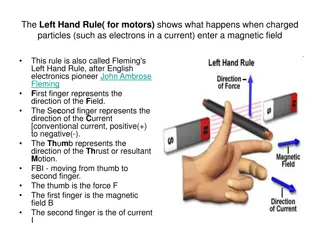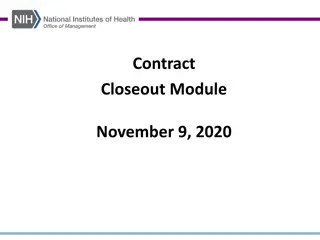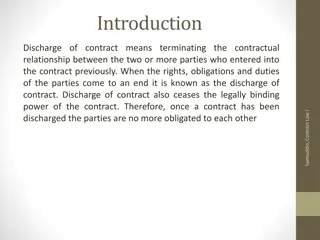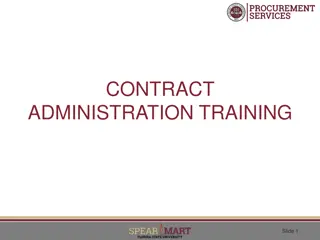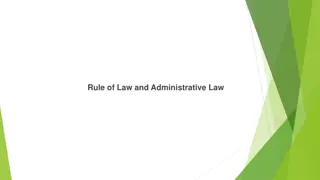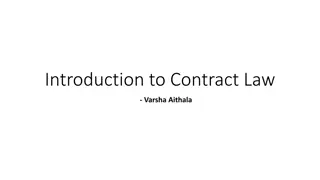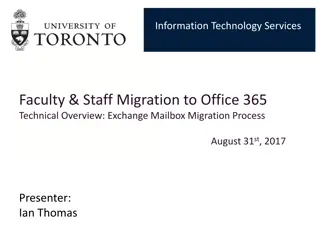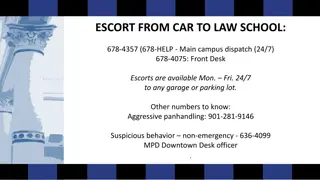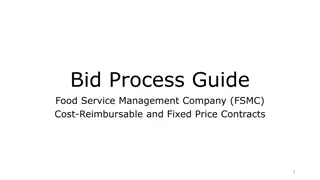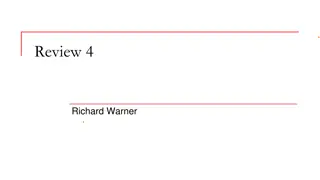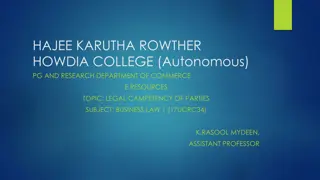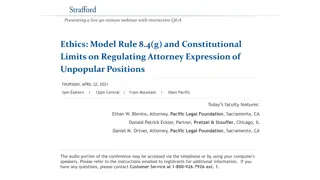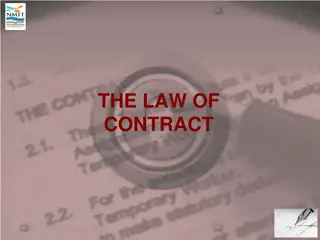The Mailbox Rule in Contract Law
The Mailbox Rule, a common law principle, stipulates that acceptance of an offer is valid when dispatched, providing certainty in contract formation. This rule is illustrated through scenarios involving delays in mail delivery and parties' need for assurance in contractual agreements. The examples highlight how the rule impacts both offerors and offerees, emphasizing the importance of timely communication in contract negotiations.
Download Presentation

Please find below an Image/Link to download the presentation.
The content on the website is provided AS IS for your information and personal use only. It may not be sold, licensed, or shared on other websites without obtaining consent from the author.If you encounter any issues during the download, it is possible that the publisher has removed the file from their server.
You are allowed to download the files provided on this website for personal or commercial use, subject to the condition that they are used lawfully. All files are the property of their respective owners.
The content on the website is provided AS IS for your information and personal use only. It may not be sold, licensed, or shared on other websites without obtaining consent from the author.
E N D
Presentation Transcript
The Mailbox Rule Richard Warner
A Mailbox Rule Fact Pattern The parties are negotiating by mail to buy a car. The seller--the offeror--mails an offer to sell to the buyer. The buyer mails the acceptance. But it takes 10 days for the acceptance to reach the buyer. In the meantime, the seller has changed her mind, and has mailed a revocation of the offer. The revocation reaches the buyer after the acceptance reaches the seller.
The Time Sequence Jan. 1 Jan. 5 Jan. 10 Jan. 15 Jan. 20 Buyer (offeree) received mailed received offer Acceptance revocation Seller (offeror) mailed received revocation acceptance
The Common Law Rule (The "Mailbox Rule") Acceptance takes effect when it is dispatched. Jan. 1 Jan. 5 Jan. 10 Jan. 15 Jan. 20 Buyer (offeree) received mailed received offer Acceptance revocation Offer still open for acceptance Seller (offeror) mailed received revocation acceptance Revocation is effective on receipt. Offer accepted
Need For Certainty, 1 The seller is a new car dealer with lots of cars, more than he can sell. The buyer is someone who is moving to a new city, and she will need a car right away. The buyer writes a dealer in the new city asking for prices. The dealer writes back with an offer. The buyer mails her acceptance, but the post office delays delivery for two weeks. The dealer changes his mind and decides to back out of the deal. By this time, the buyer has arrived in the new city and immediately needs a car. Who most needs certainty that there is a contract? (a) The buyer (b) The seller
Need For Certainty, 2 You need a car sometime in the next six months. So you have plenty of time to look for a car. It will not matter much if this or that particular deal to buy a car falls through. You see a car advertised in the newspaper. You write to ask about it, and the seller--a private party with only one car to sell--writes back with an offer. You mail your acceptance, but the post office delays delivery for two weeks. When the seller doesn't hear from you she sells to someone else and mails a revocation to you. The seller is eager to sell because she needs the money. When the second buyer comes along, she is afraid of losing the sale and acts quickly. Who most needs certainty that there is a contract? (a) The buyer (b) The seller
Point Of The Examples The mailbox rule means that the offeree has certainty about when the contract is formed. In the first example, it is the offeree that needs certainty. But in the second example, it is the offeror that needs certainty. Contract law has ways to protect the offeror when it is the offeror that needs certainty.
Ways Around the Rule Improper method of communication. Examples: The offeree addresses the letter wrong, or sends it by an unreasonably slow means--carrier turtle, bulk mail. Where the letter never gets there, or is delayed for an unreasonably long time, the court will not follow the mailbox rule; it will not hold that acceptance occurred with dispatch. The delay must not be the sender/offeree s fault. The black letter standard is that you have to use a reasonable form of response. The tutorials cover the history that leads to this rule.
Changing the Rule in the Offer in some cases the offer itself will define the method of acceptance. The offer may say: "Please reply in person", "Please reply by mail", acceptance effective on receipt etc. General rule: if the offer mentions a method of acceptance, that is the method the offeree has to use. Note: the offeror can change the mailbox rule itself. The offer can say, "The offer will not be accepted until I receive your acceptance."
Seed Co. and Brown On September 21, Seed Co. mailed a grain sample to several people, including Brown.This appeared on the face of the sample: Red clover -- 50,000 pounds like sample. I am asking 24 cents per pound. On October 4, Brown wired Seed Co.: Sample received. Your price too high. Wire firm offer naming absolutely lowest price. On October 8, Seed Co. responded: I am asking 23 cents a pound for the red clover seed. Have an offer 22 3/4 a pound. The next day Brown responded by "accepting" the "offer". Seed Co. refused to deliver. Was the October 8 communication an offer? (a) Yes (b) No
Mason Jars The buyer writes to the seller a letter that reads in part: Please advise us the lowest price you can make us on our order for ten car loads of Mason green jars, complete, with caps, packed one dozen in a case. The seller replied by return mail: We quote you Mason fruit jars, complete, on one dozen boxes, delivered: Pints $4.50, quarts $5.00, half gallons $6.50, per gross, for immediate acceptance and shipment not later than May 15. The buyer telegrammed the seller: Enter order ten car loads as per your quotation. (a) The reply we quote you . . . was an offer. (b) The reply we quote you . . . was not an offer.
International Convention of Sale of Goods Article 18: Acceptance is effective on receipt.
Uniform Electronic Transactions Act UETA is typically interpreted as altering the mailbox rule so that acceptance is effective on receipt, where receipt is defined as below. UETA 114 (b): "Unless otherwise agreed between the sender and the recipient, an electronic record is received when it enters an information processing system (1) that the recipient has designated or uses for the purpose of receiving electronic records or information of the type sent; (2) in a form capable of being processed by that system; and (3) from which the recipient is able to retrieve the electronic record." Adopted by every state (except New York), the District of Columbia, Puerto Rico, and the Virgin Islands.
UNIFORM COMPUTER INFORMATION TRANSACTIONS ACT Acceptance effective on receipt. Only Maryland and Virginia have adopted the Model Act.

 undefined
undefined





